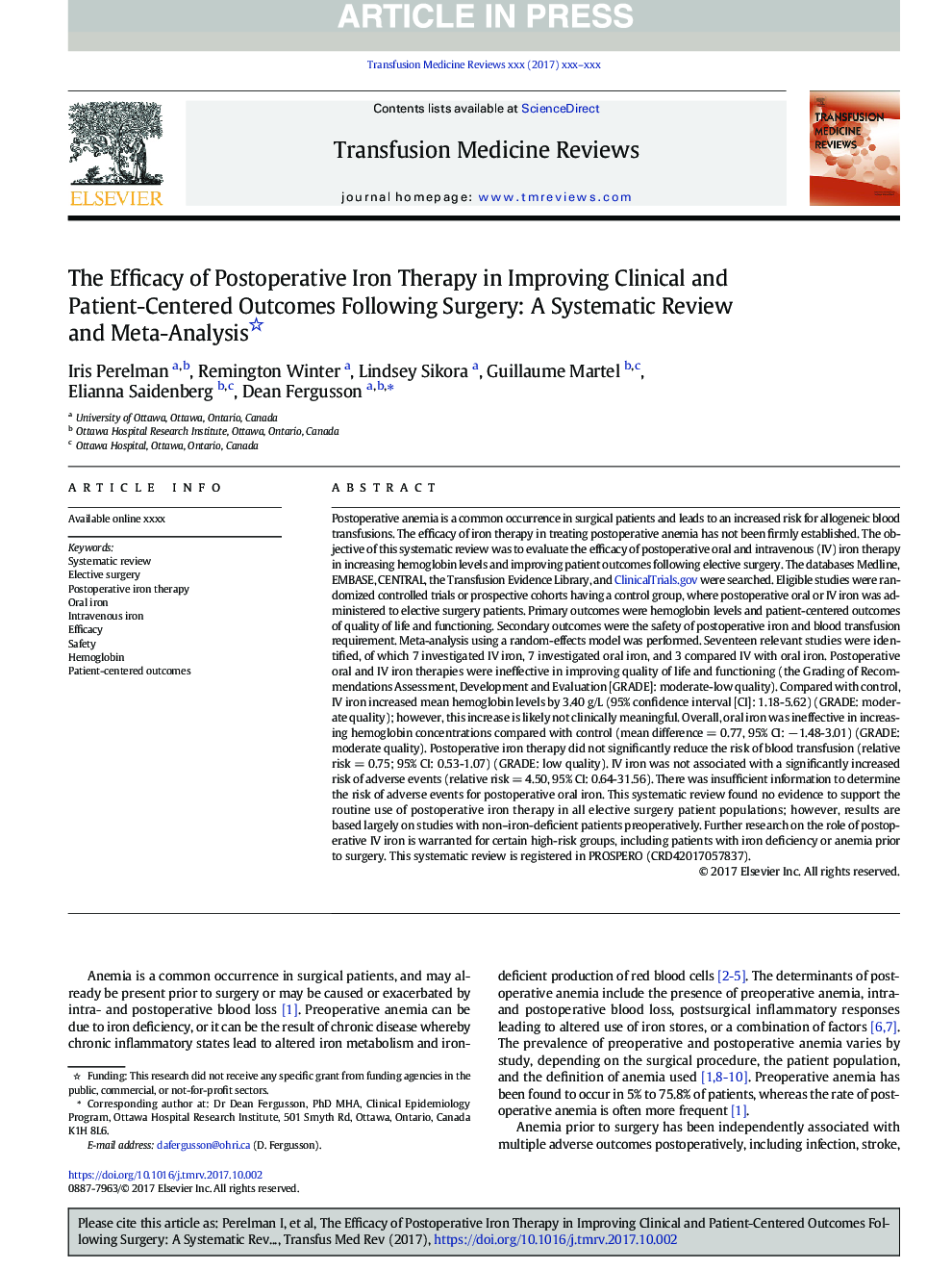| کد مقاله | کد نشریه | سال انتشار | مقاله انگلیسی | نسخه تمام متن |
|---|---|---|---|---|
| 8735178 | 1591027 | 2018 | 13 صفحه PDF | دانلود رایگان |
عنوان انگلیسی مقاله ISI
The Efficacy of Postoperative Iron Therapy in Improving Clinical and Patient-Centered Outcomes Following Surgery: A Systematic Review and Meta-Analysis
ترجمه فارسی عنوان
اثربخشی درمان آهن بعد از عمل در بهبود نتایج کلینیکی و بیمار محور تحت جراحی: یک بررسی منظم و متاآنالیز
دانلود مقاله + سفارش ترجمه
دانلود مقاله ISI انگلیسی
رایگان برای ایرانیان
کلمات کلیدی
بررسی سیستماتیک، جراحی انتخابی، درمان آهن بعد از عمل، آهن شفاهی، آهن داخل وریدی اثر، ایمنی، هموگلوبین، نتایج محور بیمار،
موضوعات مرتبط
علوم پزشکی و سلامت
پزشکی و دندانپزشکی
هماتولوژی
چکیده انگلیسی
Postoperative anemia is a common occurrence in surgical patients and leads to an increased risk for allogeneic blood transfusions. The efficacy of iron therapy in treating postoperative anemia has not been firmly established. The objective of this systematic review was to evaluate the efficacy of postoperative oral and intravenous (IV) iron therapy in increasing hemoglobin levels and improving patient outcomes following elective surgery. The databases Medline, EMBASE, CENTRAL, the Transfusion Evidence Library, and ClinicalTrials.gov were searched. Eligible studies were randomized controlled trials or prospective cohorts having a control group, where postoperative oral or IV iron was administered to elective surgery patients. Primary outcomes were hemoglobin levels and patient-centered outcomes of quality of life and functioning. Secondary outcomes were the safety of postoperative iron and blood transfusion requirement. Meta-analysis using a random-effects model was performed. Seventeen relevant studies were identified, of which 7 investigated IV iron, 7 investigated oral iron, and 3 compared IV with oral iron. Postoperative oral and IV iron therapies were ineffective in improving quality of life and functioning (the Grading of Recommendations Assessment, Development and Evaluation [GRADE]: moderate-low quality). Compared with control, IV iron increased mean hemoglobin levels by 3.40 g/L (95% confidence interval [CI]: 1.18-5.62) (GRADE: moderate quality); however, this increase is likely not clinically meaningful. Overall, oral iron was ineffective in increasing hemoglobin concentrations compared with control (mean difference = 0.77, 95% CI: â1.48-3.01) (GRADE: moderate quality). Postoperative iron therapy did not significantly reduce the risk of blood transfusion (relative risk = 0.75; 95% CI: 0.53-1.07) (GRADE: low quality). IV iron was not associated with a significantly increased risk of adverse events (relative risk = 4.50, 95% CI: 0.64-31.56). There was insufficient information to determine the risk of adverse events for postoperative oral iron. This systematic review found no evidence to support the routine use of postoperative iron therapy in all elective surgery patient populations; however, results are based largely on studies with non-iron-deficient patients preoperatively. Further research on the role of postoperative IV iron is warranted for certain high-risk groups, including patients with iron deficiency or anemia prior to surgery. This systematic review is registered in PROSPERO (CRD42017057837).
ناشر
Database: Elsevier - ScienceDirect (ساینس دایرکت)
Journal: Transfusion Medicine Reviews - Volume 32, Issue 2, April 2018, Pages 89-101
Journal: Transfusion Medicine Reviews - Volume 32, Issue 2, April 2018, Pages 89-101
نویسندگان
Iris Perelman, Remington Winter, Lindsey Sikora, Guillaume Martel, Elianna Saidenberg, Dean Fergusson,
